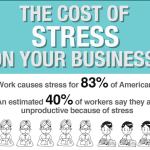
When you run a small business the pressure of day to day operations can be a lot to handle. Over time, these daily stresses tend to present themselves physically in the form of aches, pains, changes in weight, and other indicators.
The physical symptoms of stress vary by person but popular ones include back tension, jaw pain, and frequent headaches. Being able to respond to these symptoms and relieve them before you’ve gone too far is very important. After all, if you’re down for the count, your business will take a hit too. Here are some stress symptoms to look for and a few recommendations for keeping them at bay.
Fluctuating Weight
An increase or decrease in appetite is very common for people under a lot of stress. Physically, stress causes the body’s level of cortisol to increase. Cortisol, a hormone that causes people to eat and retain calories that they have consumed.
If you tend to overeat under stress, try keeping healthy snacks on hand because if eating more often than usual is a must to cope, the first action to take is eliminating unhealthy foods. Weight loss is a symptom of stress too. Some people lose appetite when they’re stressed, making it hard to eat on a regular schedule.
Problems with Digestion
Sometimes stress leads to issues in the digestive tract. It can cause diarrhea or constipation, and for some, it might cause both. People who have irritable bowel syndrome are at greater risk of developing these symptoms but anyone is susceptible. Other digestive problems associated with stress include bloating and cramping.
Our colons are linked to our nervous systems, which explains how these digestive issues are present during stressful times. Another reason we experience these symptoms is due to changes in diet and from not drinking enough water. Some digestive issues go away on their own after the stressful period passes but you should be proactive and focus on eating healthier meals with larger portions of fruits and veggies.
Frequent Headaches
If you notice more headaches than usual but you don’t seem to be drinking less water, stress may be the reason. Stress often results in overall body tension which can lead to a headache. So does lack of sleep, increased alcohol consumption (in some case), and of course dehydration. Prevent headaches caused by stress with lots of water and yoga or meditation to loosen up the muscles.
Acne Breakouts
One of the more visible symptoms of stress is acne. Acne breakouts and blemishes can be caused by a lot of different things. If you’re prone to touching your face more when stressed, this might be causing the breakouts. Treat acne flare-ups caused by stress is with products made using sodium sulfacetamide. Use a sulfur wash with aloe (anti-inflammatory properties) and green tea (an antioxidant) to clean the pores deeply and to manage red patches or blotchiness. If acne breakouts continue, it’s probably time to see a doctor for stronger prescription acne medications.
Weakened Immune System
Stressful days quickly turn into sick days if we work too hard without enough self-care. Stress puts pressure on the immune system, which makes our bodies more susceptible to infection. Protect yourself from these sicknesses by taking daily vitamins, eating healthy, and washing your hands frequently. If you’ve already caught a cold, grab some Emergen-C or take Vitamin C supplements and hydrate the best you can.
Muscle Tension and Body Aches
Stress often presents itself in the form of tense, achy pains in our jaw, shoulders, neck, and back. This can be caused by bad posture, teeth grinding or clenching, and other tense habits. Mitigate these body pains with massage therapy and stretching every day. Yoga is another amazing way to treat these physical pains. Calming baths and saunas or steam rooms can be a great help too.
As a small business owner, we all ebb and flow through periods of stress. It’s crucial we can recognize these stressful times, identify stress symptoms, and find treatment to keep them at bay. Be sure to take breaks, get enough exercise, and eat healthy to keep this stress to a minimum.














